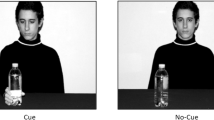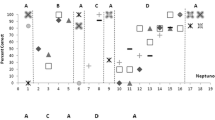Abstract
One explanation for the persistent social disabilities of individuals with autism is based on the nature of social stimuli, being transient, complex and very difficult to predict. It was suggested that autistic people's performance on cognitive perspective-taking tasks (a measure of understanding of other people) would be enhanced with increased predictability and reduced transience of stimulus materials. Thus autistic and control subjects were tested on Baron-Cohen, Leslie, and Frith's (1985) “Sally/Anne” task and on two other perspective-taking tasks that involved more predictable interactions and nontransient cues. Autistic subjects differed significantly from the control subjects in their ability to perform Baron-Cohen's task but not the other tasks. As well the autistic subjects performed significantly differently on the two types of tasks. Failure of the autistic subjects on the Sally/Anne task with their concurrent success on the other tasks can best be attributed to the nontransient nature of the stimuli used and the predictability of the protagonists' reactions in the two tasks on which they succeeded.
Similar content being viewed by others
References
Asarnow, R. F., Tanguay, P. E., Bott, L., & Freeman, B. J. (1987). Patterns of intellectual functioning in non-retarded autistic and schizophrenic children.Journal of Child Psychology and Psychiatry, 28, 273–280.
Baron-Cohen, S., Leslie, A., Frith, U. (1985). Does the autistic child have a “theory of mind”?Cognition, 21, 37–46.
Baron-Cohen, S., Leslie, A. M., & Frith, U. (1986). Mechanical, behavioural and intentional understanding of picture stories in autistic children.British Journal of Developmental Psychology, 4, 113–125.
Donaldson, M. (1978).Children's minds. London: Fontana/Croom Helm.
Dunn, L. M., & Dunn, L. M. (1981).Peabody Picture Vocabulary Test-Revised. Circle Pines, MN: American Guidance Service.
Frith, U. (1989). Autism: Explaining the enigma. Oxford: Basil Blackwell.
Hobson, R. P., Ouston, J., & Lee, A. (1989). Naming emotion in faces and voices: abilities and disability in autism and mental retardation. British Journal of Developmental Psychology, 7, 237–250.
Hughes, M., & Donaldson, M. (1979). The use of hiding games for studying the coordination of viewpoints.Educational Review, 31, 133–140.
Leslie, A. M., & Frith, U. (1988). Autistic children's understanding of seeing, knowing and believing.British Journal of Developmental Psychology, 6, 315–324.
Mesibov, G. B., Schopler, E., Schaffer, M. A., & Michal, N. (1989). Use of the childhood autism rating scale with autistic adolescents and adults.Journal of the Academy of Child and Adolescent Psychiatry, 28, 538–541.
Oswald, D. P., & Ollendick, T. H. (1989). Role taking and social competence in autism and mental retardation.Journal of Autism and Developmental Disorders, 19, 119–127.
Perner, J., Frith, U., Leslie, A. M., & Leekham, S. R. (1989). Exploration of the autistic child's theory of mind: knowledge, belief, and communication.Child Development, 60, 689–700.
Perner, J., & Ogden, J. E. (1988). Knowledge for hunger: children's problem with representation in imputing mental states.Cognition, 29, 47–61.
Prior, M., Dahlstrom, B., & Squires, T. L. (1990). Autistic children's knowledge of thinking and feeling states in other people.Journal of Child Psychology and Psychiatry, 31, 587–601.
Reed, T., & Peterson, C. (1990). A comparative study of autistic subjects' performance at two levels of visual and cognitive perspective taking.Journal of Autism and Developmental Disorders, 20, 555–567.
Russell, J., Mauthner, N., Sharpe, S., & Tidswell, T. (1991). The ‘windows task’ as a measure of strategic deception in preschoolers and autistic subjects.British Journal of Developmental Psychology, 9, 331–349.
Schopler, E., Reichler, R. J., & Renner, B. R. (1990).The Childhood Autism Rating Scale Los Angeles: Western Psychological Services.
Tager-Flusberg, H. (1985a). The conceptual basis for referential word meaning in children with autism.Child Development, 56, 1167–1178.
Tager-Flusberg, H. (1985b). Basic level and superordinate level categorization by autistic, mentally retarded and normal children.Journal of Experimental Child Psychology, 50, 450–469.
Ungerer, J. (1989). The early development of autistic children: Implications for defining primary deficits. In G. Dawson (Ed.),Autism nature, diagnosis and treatment (pp. 75–91). New York: Guilford.
Author information
Authors and Affiliations
Additional information
The author thanks the staff, parents, and children from the Associations for Autistic Children of Western Australia, Queensland, and South Australia. In addition, the staff, students, and parents of a number of day care centres, schools. Education Support Centres and special schools in Western Australia provided a great deal of patient assistance. I thank C. Peterson and D. Leach for their valuable supervision in the early stages of this project and I especially thank S. Dziurawiec for her excellent advice and generosity in the time she spent reading this paper in its final stages. Finally, I particularly thank Tom Reed for his endless support and encouragement and always excellent advice.
Rights and permissions
About this article
Cite this article
Reed, T. Performance of autistic and control subjects on three cognitive perspective-taking tasks. J Autism Dev Disord 24, 53–66 (1994). https://doi.org/10.1007/BF02172212
Issue Date:
DOI: https://doi.org/10.1007/BF02172212




